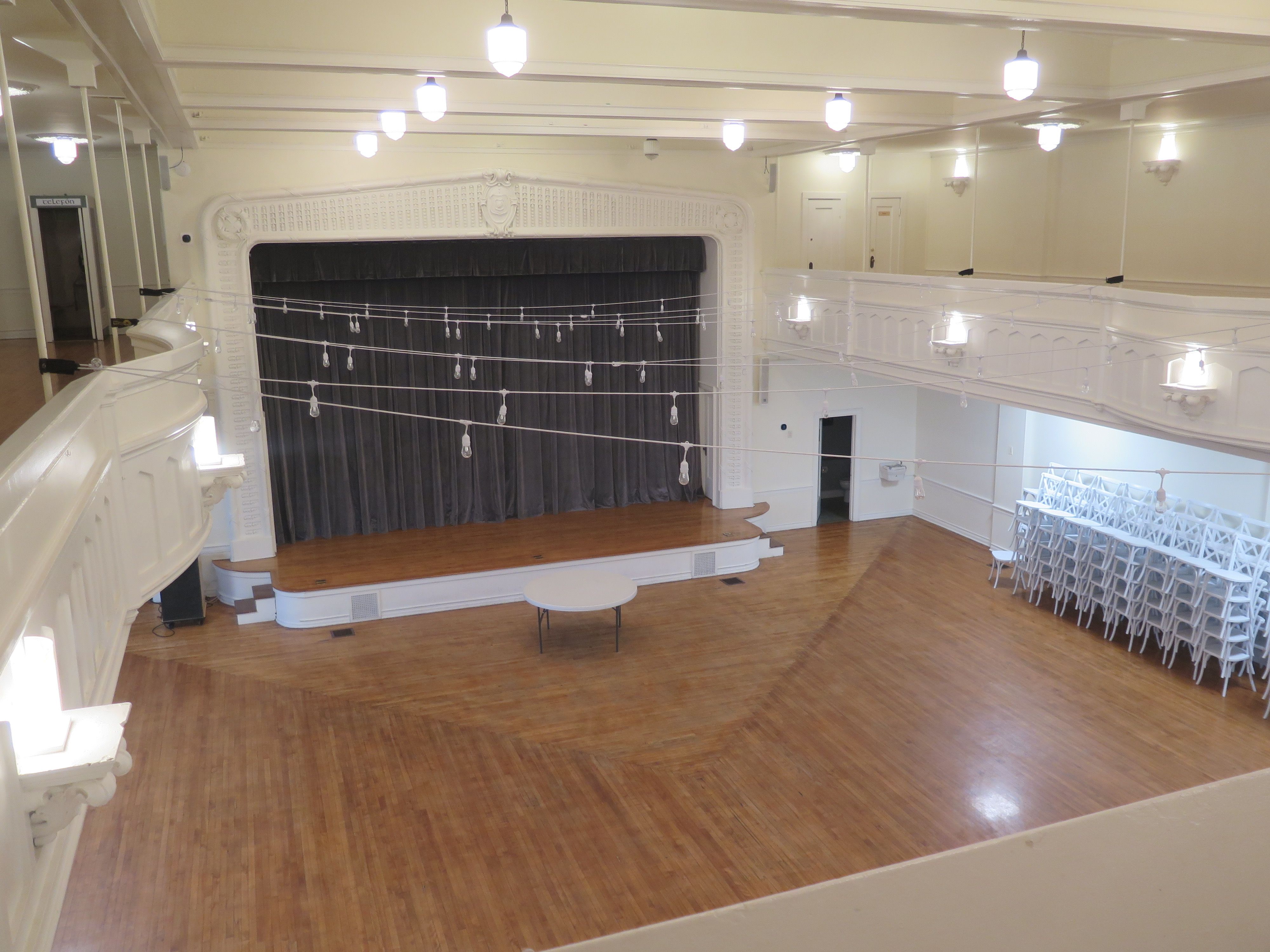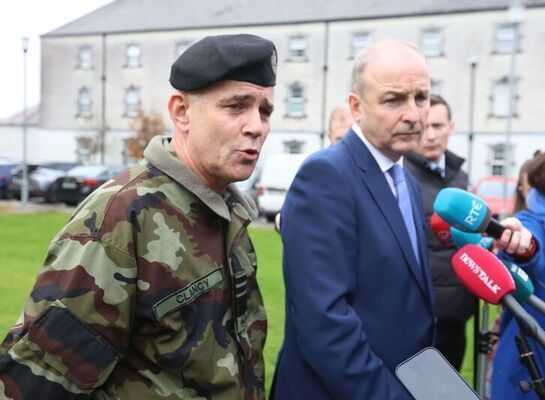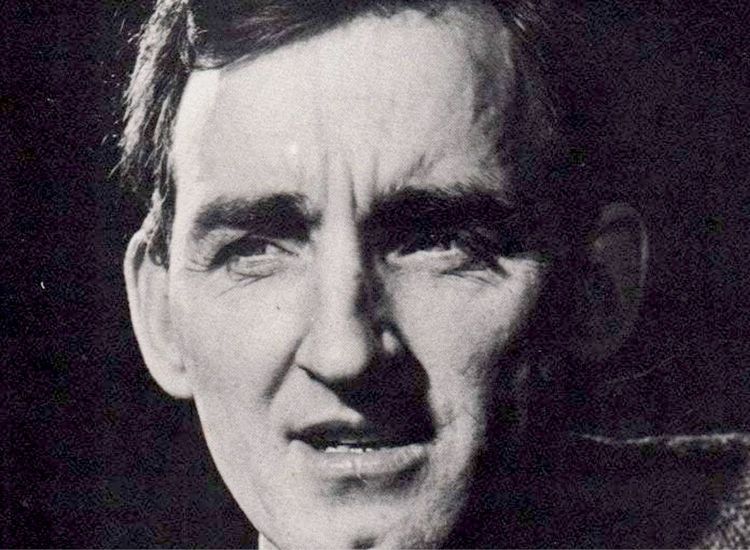Mary Kate Gliedt is impressed with Kansas City, Mo.
Specifically, she’s impressed with the Irish there.
She grew up just three hours down the road in St. Louis, Mo., and knows and feels privileged to have worked in other communities.
But none has anything quite like Drexel Hall, home of the Kansas City Irish Center, where Gliedt has been executive director since September 2022.
The building’s interior seems shiny and new, as if created for a movie set. In fact, it’s a ballroom dating back to 1910, when it was founded by Austrian immigrant Barbara Drexel.
“It was built as an event space,” the executive director said. “It’s always been that.”
What sets the Kansas City Irish community apart, for Gliedt, is the ambition, together with the “blood, sweat and tears,” that made the acquisition of Drexel Hall possible.
“Irish dancing is huge in St. Louis. There are nine schools. But they’ve no home,” Gliedt said about Missouri’s other major city. “My former Irish dance teacher said, ‘I’m so jealous of you!’”
Gliedt was speaking in a book-lined room where the genealogy group meets, as does, unsurprisingly, the book club. She revealed that one impressive set of shelves was made for the center by the lead singer of Celtic rock band, the Elders, which suggests there’s an attention to detail that goes with the grand vision.
“When I think of the community here,” the executive director said. “I think of how invested they are and how much they really, really care.”
She said that applies to the center itself and its board, which supports her throughout the year, but it’s also true of the St. Patrick’s Day Parade, the Kansas City Irish Festival and a number of businesses, including Browne’s Irish Marketplace, which is nearby.
“It’s a cool thing to watch, when that hasn’t really been my experience before,” she said.
Like many Midwesterners, Gliedt can claim multiple ethnicities in her background, Scottish and Danish among them. But one predominated as an influence.
“My mom was really involved in her own heritage,” she said. “That’s where the Irish side comes in. My dad was less so with the German side.
“I grew up in what felt like a really Irish house,” she remembered. “My mom would play Irish music; I was Irish dancing from a very young age.”
Although an only child herself, her mother was from a big family, which tended to reinforce the feelings of Irishness.
As for Irish dancing, “It’s a real gateway drug,” she said, with a laugh.
“I love that community,” she continued. “How ‘Riverdance’ changed the game entirely was something I was lucky to see before and after.”
“It’s so interesting to see how diverse the field can be and how it does act as a gateway into this Irish culture.
“It’s true for a lot of people that Irish dance is the key to getting into Irish music and then, ‘I want to read a book from Ireland, see theatre about Ireland, explore the language,’ that kind of stuff.”
When as a teenager Gliedt was looking at college options, she was advised that Irish studies programs were the perfect track for an academic life. But that held little appeal for her. Ultimately, she chose to major in English, with a specialization in Irish literature, at Creighton University in Omaha, Neb.
Later on, she got a master’s degree in museum studies at New York University.
“The cultural sharing that museums do was really what I liked,” Gliedt said.
While at NYU she took some classes at Glucksman Ireland House and then moved on to the world of work at the Lower East Side Tenement Museum.
Back home, she spent 18 months with the St. Louis Public Library. During the pandemic, she contacted the Kansas City Irish Center asking if she could help in some way.
“That started the conversation of bringing me to Kansas City,” she recalled.
The pandemic, of course, affected the center’s operations; not least the fact that 2020 was booked up with weddings that didn’t happen. But the break allowed for the completion of some renovations with funds provided by the Department of Foreign Affairs’ Emigrant Support Program.
Also on the positive side: social distancing wasn’t ever an issue for such a small staff in such a big building.
Gliedt had worked as an intern with the Kansas City Irish Center during college. “I had a really, really great experience,” she recalled, adding that executive director Nancy Wormington became from that time a friend and mentor.
Gliedt made a permanent relocation from St. Louis to Kansas City in January 2022 to become program director. A few months later, Wormington, who had overseen the center’s 2016 move from a space in Union Station to Drexel Hall, announced her retirement after 12 years in the position.
The board initiated a search before deciding that they already had the ideal replacement on staff.
By that point in her life, Gliedt had a clearly developed philosophy of her Irishness. “Having the culture be part of my life every day and not just studied in a book,” she said. “That is the trajectory that my Irish culture takes. I like doing it, I like being it, I like embodying it – dancing, language, reading.”
Gliedt in conversation referred to people like herself being in the “4th and 5th tiers” in terms of generations. Some in that category will enthusiastically embrace their Irishness, or an aspect of it; most, however, “don’t feel it as much as the 2nd and 3rd tiers,” who form the heart of the community in Kansas City.
“Our Irish-born community is definitely not as big as it once was,” she said. Those who got visas in the 1980s and ‘90s faithfully attend the fest, which takes place Labor Day Weekend, and the millennials are GAA enthusiasts.
“Their presence is felt and their opinions are valued,” Gliedt said of that 1st tier of the diaspora.
But it’s those 2nd and 3rd tiers, who were born in the Kansas City area and grew up with an Irish-born parent or grandparent, that lead the way in the community.
“They don’t know anything else. They come from big families and they have this experience.
“Longevity matters,” Gliedt said, referring to the building. “It’s not going anywhere. There’s comfort in that. It’s a safe space for the culture.”
The center was founded “to promote, support and celebrate Irish culture in Kansas City.”
“So that’s our mission on paper,” the executive director said. “For me, I want this to be a space that anyone can walk into and feel welcome, can access the Irish culture that we are proud of, [and] don’t have be Irish themselves.
“They can come for everything or anything and we offer a pretty wide range of cultural activities: language classes, a book club, concerts.
“I’d like to see those blend. I don’t mind that they don’t,” she said.
Sometimes the center can meet “many needs of people who are really invested in it. Or someone who’s read James Joyce and who wants to read more Irish books, and doesn’t care so much about Irish music or Irish dance. That’s okay, too.”
The layout of Drexel Hall’s warren of offices facilitates a certain blending. “We’re very fluid about how our conversations can be,” the executive director said. “It’s very congenial and friendly, very Irish. Our volunteers are part of that, when they come in on Mondays.”
People walk into her office with a question or a suggestion, and quite often it’s about family roots.

A view of the ballroom in Drexel Hall.
“Our genealogy is booming,” she said. “It’s a thing people really like from us.”
Gliedt knows from being involved with the subject at the St. Louis Public Library that people prefer to ask someone and to trouble-shoot in person rather than take a book from the shelf.
“It’s community orientated,” she added about genealogy as an activity.
The executive director said of resident roots expert Barbara Scanlon, “She can get anybody back to anywhere. And it is about getting back to Ireland for the most part.”
That’s related often to wanting to travel there.
Gliedt said people feel that they’ve figured out their American story. It’s less interesting to them. In her own case, there’s an “unknown in Clare that I didn’t have in St. Louis.”
The travel happens in the other direction also.
“We work pretty heavily with Culture Ireland, Tourism Ireland, promoting what they’re doing,” she said.
“Certainly, in festival season, we get folks who are looking for a stopover between Milwaukee and Chicago and [they] make that triangle.
“And part of the fun of having the hall is that local musicians can do concerts here and rent from us and if we work the bar downstairs, we get the profit.
“Our concerts are the most popular things we do,” she said.
The center also partners on events with groups like the Golden Gloves, the juvenile boxing organization.
“We learn about our wider community when we do those events, too,” the executive director said, adding that the center “gives the Irish community something to be proud of.
“That is a key space for our community for weddings, for funerals, for dance, for language classes. That’s not lost on anyone in our community.
“It’s always there,” Gliedt said.
For more information about the Kansas City Irish Center, visit irishcenterkc.org.









